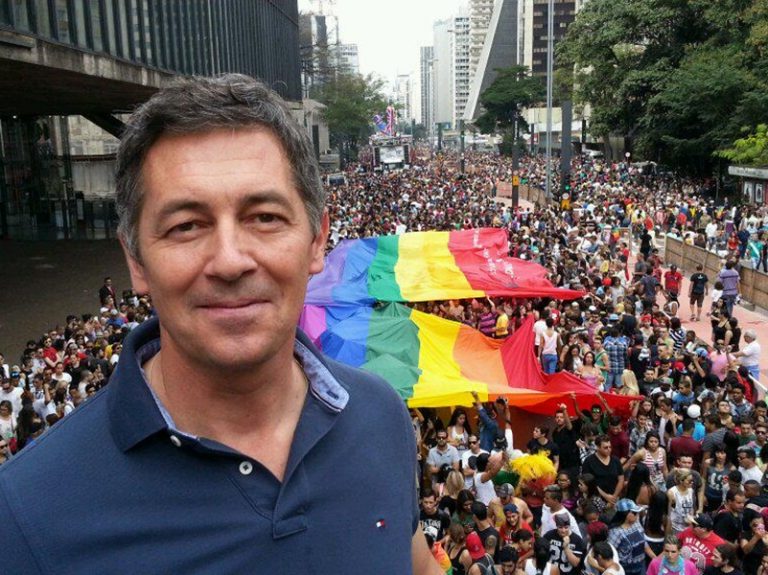US Government’s Special Envoy for the Human Rights of LGBTI persons, Randy Berry, will participate in an online panel discussion in Bíó Paradís tonight, following a screening of the documentary “Matt Shepard is a Friend of Mine”; an event hosted by The American Embassy in Iceland in co-operation with GayIceland. We spoke to Berry about hate crimes, discrimination and the need for social change.
SE Randy Berry will address the audience through Skype although he’s quite keen on coming to Iceland on an official visit some time. Having only done a 24 hour stop-over here in mid-winter, he says he’d like to come for a proper visit again. “But in summer,” he says laughing.
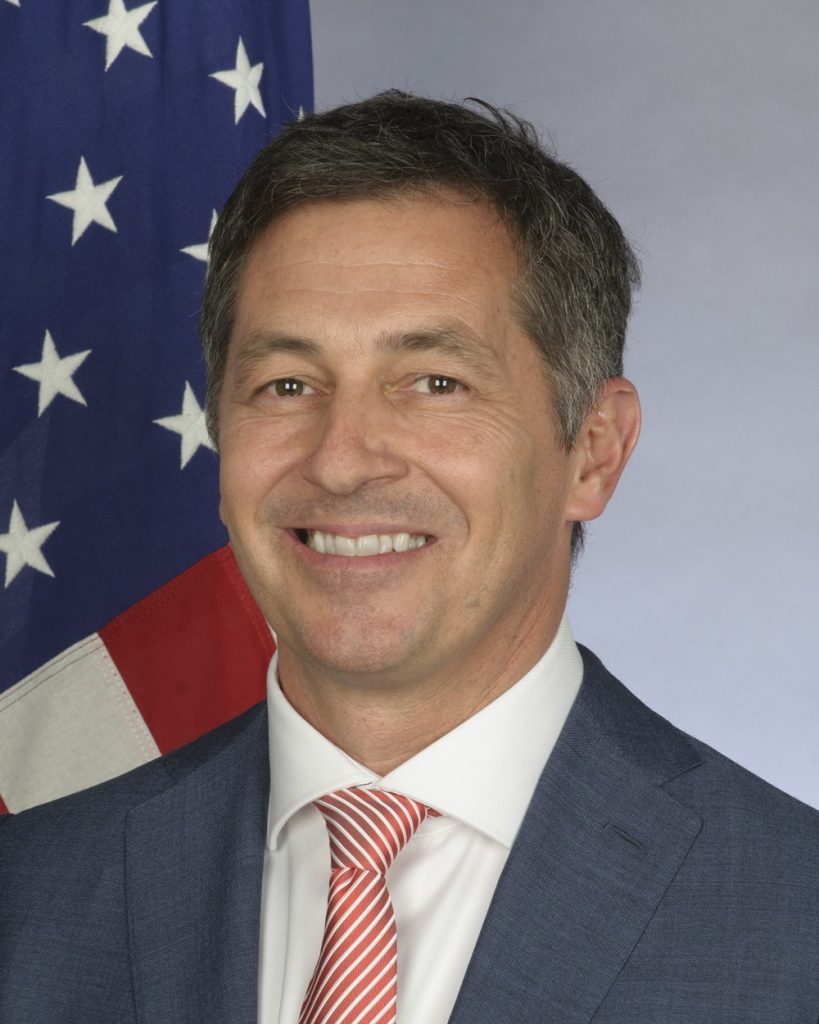
“There’s good co-operation between the US and Iceland on the LGBTI issue. Iceland is in fact one of 12 national governments that founded something called the Global Equality Fund. There’s a common perception out there that it’s an American fund but it’s not. It was founded in 2011 through a joint partnership of a number of national governments, a number of businesses and a number of foundations; governments form about half of the entities involved, and businesses and organizations the rest. And what we do is we pool our resources and our contributions, that money then gets turned around and farmed out to local civil society organizations. In these five years since the Global Equality Fund was established, we’ve assigned about $30,000,000 in assistance to small groups in almost 80 countries. And Iceland is a partner in that family.”
Why do you think it is important for the US Government to take part in organizing and promoting an event like the screening of “Matt Shepard is a Friend of Mine”? “I think that events like this are really important because, over the last year, it‘s become really clear to me that globally our greatest challenge is a lack of knowledge about what it means to be a member of the LGBTI community; a lack of knowledge of the human issues and the human reality that is attached to it.
So, you know, I think that a lot of the time there‘s only talk about policy and politics and law and regulations but I think it‘s really important to talk about the human aspect of this as well. And I think films like this one are very effective in doing that because they tell a story, they personalize very effectively the ramification of hate and misunderstanding. They put a face to an issue which I think is very helpful for people who may not be very familiar with these issues, I think it‘s much easier for people to be able to grasp the issue, to understand those human dynamics and I think we all benefit from that deeper understanding.
“… you can build understanding and love and hope out of a tragedy… We don‘t have to allow that kind of tragedy to defeat us.”
Regarding this film in particular, Matthew‘s mother and father have been extraordinarily active in those years following Matthew‘s death in making sure that his story didn’t end with his death, that in fact the story has been continued, whether that‘s been through the establishment of hate crime legislation or what. I mean, Matthew‘s death was the tragedy that mainly spurred our government into action to get hate crime legislation on the books. And the Shepards continue to travel with the film and talk about what that lack of understanding and hate meant for Matthew‘s lost potential. People who may even have difficulty coming to terms with this kind of issue, I think it‘s really good for them to hear the parents‘perspective. To understand this in any way. So for all of those reasons, we think this is a really important way to spur broader discussion on these issues. “
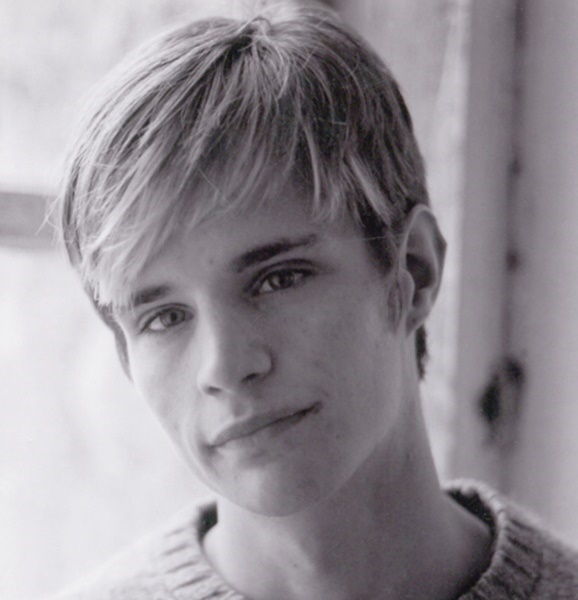
The Obama administration has been a powerful advocate for LGBTI+ rights, not only domestically but also abroad. Why is supporting and advocating for LGBTI+ rights so important internationally? “We live in a world where still nearly 75 countries have some form of criminalization [of homosexuality] in place so I think that‘s a realization; to understand that while we have seen great progress here, things are different somewhere else. Mainly, to realize two things: one, there are many countries around the world that have been more progressive and came around to the equality and diversity agenda much earlier than we did – Iceland is one of them but there are many others. And two, look at those countries where the conversation is still new and hasn’t taken shape yet. And then consider how we build bridges between those two realities.
You know, I look at innovation that‘s been realized throughout the traditional leadership on this in Northern Europe, I’ve been very pleased to see the leadership that has shaped up around this issue in South-America now and I think there‘s truly a global movement underway. And it‘s not happening because of anything we‘re doing, it exists, it‘s happening anyway. What I‘m happy to do is to see what the US government can do through our contacts, through our ability to convene meetings and enter our program and just to help the universe more in this direction. It‘s going to succeed anyway, I have no doubt about it. I‘m just very focused on that role we can play, constructively, to speed the conversation on.”
As a part of that, you were appointed the State Department’s first ever LGBTI Human Rights Envoy early last year. Can you tell us a little bit about the role you play? “I was sworn in February 2015 but began working in April so it’s been 14 months that I‘ve been worked in this capacity. There are a couple of different, important aspects to this role. To understand this role you have to understand that this represents a new mechanism, a new tool for us, but not a new policy commitment.
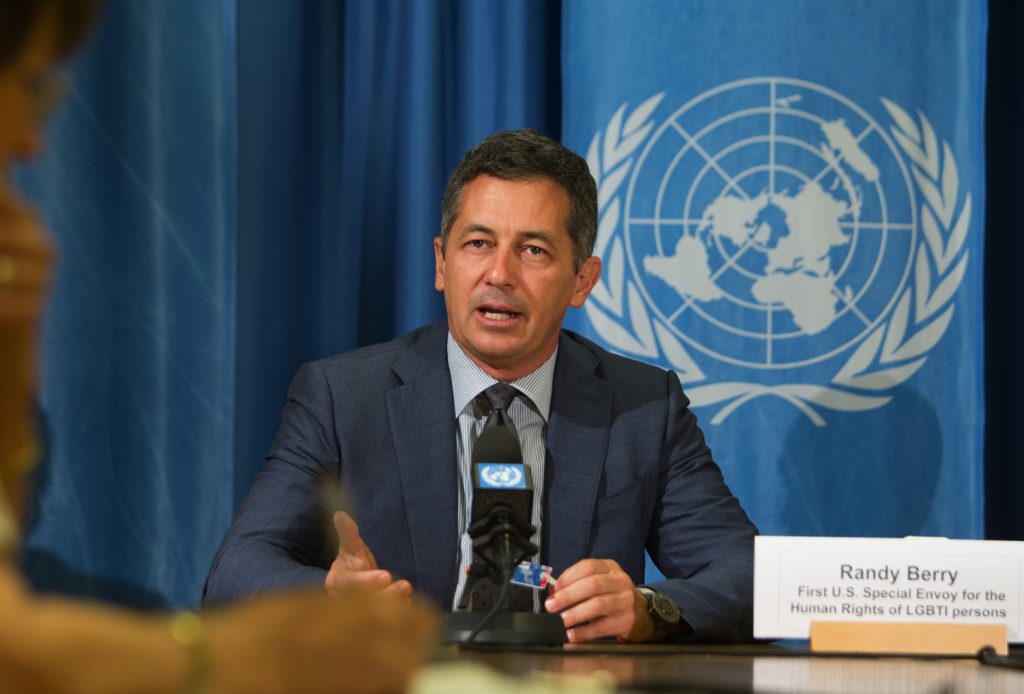
“…I often get the message in more conservative societies that they‘re not quite ready for this conversation … I think they just need to get over this tendency … to pretend that if you don‘t discuss LGBTI issues, then you don‘t have gay people in your country.”
We’ve been working on LGBTI rights as part of foreign policy priority since 2011 at the direction of the President and the Secretary of State at the time, Hilary Clinton. We have been gradually accelerating our engagement and our programming over that period and then the step taken in early 2015 was merely to add this Special Envoy role to convene meetings at a more senior level, to play a co-ordinational role internally within the US government to make sure that those agencies working on LGBTI issues as a foreign policy priority are being more consistent in their engagement. And then importantly, also to be the point person for contact with governments around the world, with leaders in civil societies around the world; to be a spokesperson in terms of media contact, and others.
So it‘s quite a broad role. But we‘ve been extraordinarily active; I just returned two days ago to Washington from the Ukraine. Ukraine was the 43. country I‘ve visited in those 14 months. And these visits always leave me more and more hopeful. Not naive and blind to the fact that there‘s great challenge out there and still a lot of violence and hateful discrimination but that ultimately the examples of leadership I‘m seeing in so many places, especially from leaders in civil society, leaves me beyond hopeful but certain that positive change is coming.”

And how has your message, and in general the US government’s policy on LGBTI+ rights, been received? “In general I‘d say that these have been very effective, constructive engagements on our issues. Obviously when I travel in places like Sweden, Finland or the Netherlands or in South-America or any of these countries that have taken on such leaderships, there‘ll be conversations that are very positive about co-ordination on the international stage and how we can work together.
That‘s not the conversation in many other places where we‘re talking about the need to remove criminalization statues, for example. I‘ve invested my voice and energy here to engage people in those places, even those that we disagree with substantially. If we can encourage small reforms first, that‘s still a reform. I‘ve been very careful not to issue condemnations or wag a finger but to engage because the kind of change that we seek, wherever it occurs, if we want it to be sustainable and we want to make sure that it‘s truly a meaningful change, that really only comes about through a dialog and through changing minds and hearts.
You don‘t get that kind of change through force. You can compel certain types of compliance through force but again, the long-term investment we‘re making here is to see a real social change.”
Hate crimes and discrimination affect the lives of many LGBTI+ people around the world. How can other governments and advocacy organizations help reduce the violence the LGBTI+ community endures in many parts of the world, and at the same time promote understanding and inclusion? What are the first steps they could “easily” take? “I think that there are several but I think it depends on each country; I think each country is a bit different, each society is a bit different in what the most urgent needs are. But there are always steps that we can take, some of them are not so easy but some are.
“I think films like this one are very effective … because they tell a story, they personalize very effectively the ramification of hate and misunderstanding. They put a face to an issue which I think is very helpful for people who may not be very familiar with these issues.”
Across the board, I would say the most prominent one is that a government can take a look at the criminalization that exists on the books. As I mentioned, 75 countries still criminalize [homosexuality] but about ¾ of them are neither laws that are implemented nor are people convicted for them. There are a few countries of greater concern to us where that does happen but for a vast majority of these governments, they are simply laws that they inherited; they‘ve never been implemented so when we‘re out having a conversation about this we ask: “Why do we leave them on the books?” Because even if they don‘t enforce them, it still gives avenues to those who would bully or otherwise discriminate and encourages that kind of social lack of progress. So I think governments need to take a look at that. And they need to take a look at simply engaging in conversations to get it out of the shadows.
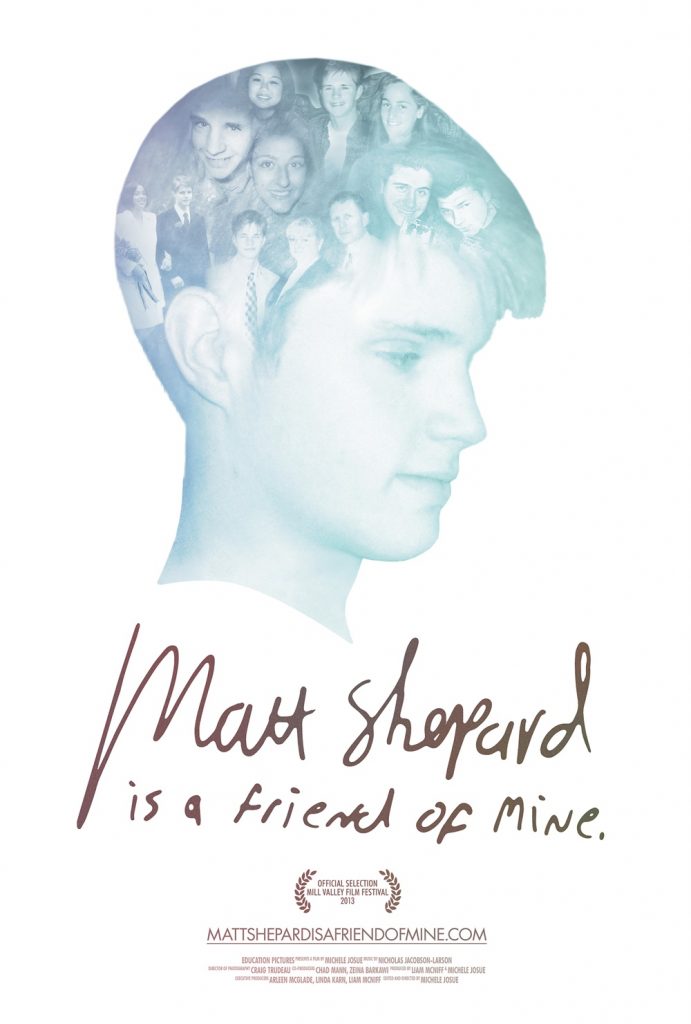
When I‘m travelling I often get the message in more conservative societies that they‘re not quite ready for this conversations or that it‘s taboo to discuss issues like this in their countries. And I understand that, these are conversations that haven‘t been enjoying much success in many equations. But, you only say it‘s impossible until it‘s possible. And as we saw in my country, you know, 30 years ago when I was growing up we also didn‘t talk about these issues! But then we started to. And that is with everything. I think they just need to get over this tendency to not want to discuss this or to pretend that if you don‘t discuss LGBTI issues, then you don‘t have gay people in your country.
So I think it‘s mostly about engaging on this human realities and talking about these issues. And I think we have the ability to destigmatise it substantially with just a bit more honest conversation.”
You will be taking part in an online panel after the screening of Matthew Shepard is a Friend of Mine in Iceland on Tuesday. What is your message? “That you can build understanding and love and hope out of a tragedy. When Matthew was killed, he was living in the western state of Wyoming. I grew up in a very similar community just south of there, in the state of Colorado. The similarities between the sort of environments he grew up in and my own are not lost on me. But his potential, his life was robbed of him through this problem with hate. But you know, we can build on that. We don‘t have to allow that kind of tragedy to defeat us. That‘s why I really enjoy working with his mom and dad because they have for many years had this idea that his story hasn‘t been completely written yet, that his legacy and that our ability to – in a global sense, not only in the US – to see change occur and that can be very, very powerful.”
*Less than 36 hours after we interviewed SE Randy Berry, the Orlando shooting took place. As a response, Berry tweeted: “Deeply saddened by the news from Orlando, and thoughts and condolences to our brothers and sisters in Florida.”
Later, President Obama gave a public response, condemning this act of hate: “This is an especially heartbreaking day for all our friends — our fellow Americans — who are lesbian, gay, bisexual or transgender. The shooter targeted a nightclub where people came together to be with friends, to dance and sing — to live. The place where they were attacked is more than a nightclub — it’s a place of solidarity and empowerment where people have long come together to raise awareness, speak their mind and advocate for their civil rights. So this is a sobering reminder that attacks on any American — regardless of race, ethnicity, religion or sexual orientation — is an attack on all of us and on the fundamental values of equality and dignity that define us as a country.”
Main photo: Special envoy Randy Berry at Sao Paulo’s PRIDE parade in 2015.

